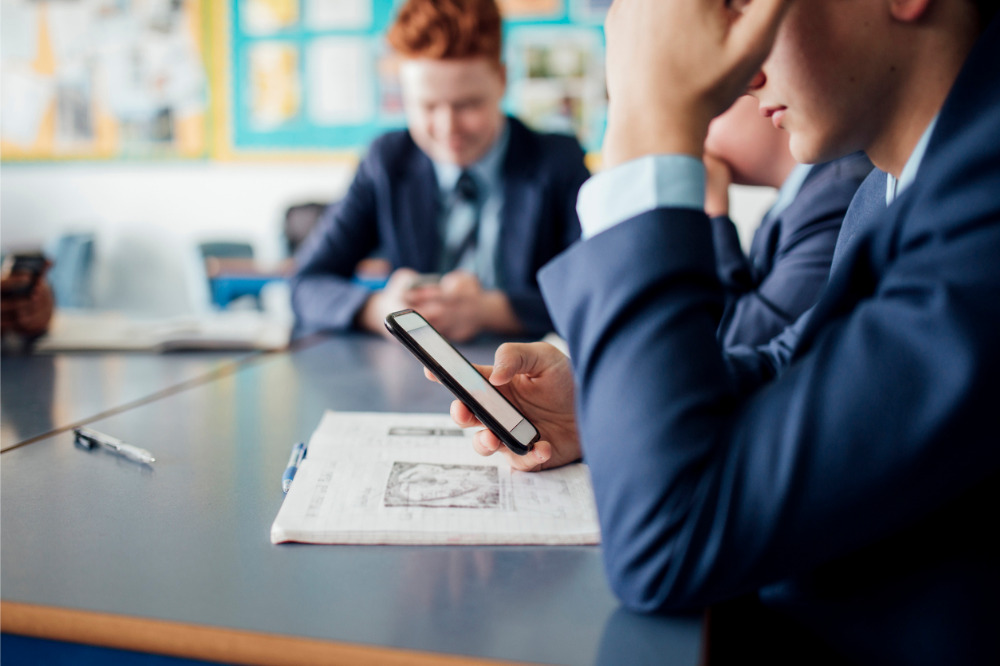
Mobile phones and wearable technology like smartwatches will be banned at all Queensland state schools during school hours – including break times - from Term 1, 2024, the state’s government has announced.
Principals and school leaders across Queensland have already implemented bans, with more than 95% of schools having a clear policy banning the use of phones during class times and the remaining schools restricting usage informally.
A growing number of teenagers are choosing not to read for fun, with a staggering 89% of teachers saying social media is having a negative impact on children's reading habits.
A nationally consistent approach
Following the full implementation of recommendations from the Anti-Cyberbullying 2018 Taskforce, all state schools are mandated to manage mobile phones to combat cyberbullying and classroom distractions. Earlier, an independent review was initiated to investigate current policy and to discuss a national approach.
The reviewer, Cheryl Vardon, suggests statewide restrictions on mobile phone access during school hours. Once her report is received, the Department will guide schools in enforcing the ban, adjusting for school-specific circumstances. Efforts will continue to establish consistent guidelines across states and territories.
Queensland’s Education Minister Grace Grace said the new measures “build on the excellent work” of the state’s principals and school leaders to date.
“Under our existing policy, almost all our state schools have implemented some kind of ban on the use of mobile phones, and they have been fully supported to do so,” she said. “This statewide ban will provide uniformity, extend bans to break times, and include certain wearable devices like smartwatches.”
Minister Grace added that as has been the case for many years, principals who want to introduce or update bans before next year can do so.
A growing national trend
Queensland’s move follows a decision by the NSW Government in April to ban mobile phones in its high school classrooms from Term 4, 2023.
The ban on mobile phones in NSW high schools brings the state in line with schools in South Australia, the Northern Territory, Victoria, Western Australia, and now Queensland.
“I know many parents who are anxious about the pervasiveness of phones and technology in our children’s learning environments. It’s time to clear our classrooms of unnecessary distractions and create better environments for learning,” NSW Premier Chris Minns said in April.
“These bans will be applied with common sense and in consultation with the experts, to ensure it works to improve our children’s learning outcomes.”
Research supports phone bans in classrooms
In 2015, Louis-Philippe Beland, Assistant Professor of Economics at Canada’s Carleton University, led a study into the effect of banning mobile phones on student performance. The findings of the study, published in a 2021 article that appeared in The Conversation, looked at several recent papers, which all point to the positive impact of banning mobile phones at school on student performance and other outcomes.
“We found banning mobile phones at school leads to an increase in student performance. Our results suggest that after schools banned mobile phones, test scores of students aged 16 increased by 6.4% of a standard deviation,” Assistant Professor Beland said, pointing out that this is equivalent to adding five days to the school year or an additional hour a week.
“The effects were twice as large for low-achieving students, and we found no impact on high achieving students. Our results suggest low-performing students are more likely to be distracted by the presence of mobile phones, while high performing students can focus with or without mobile phones”.
Beland said the results of the paper suggest banning mobile phones has considerable benefits, including a reduction in the gap between high- and low- achieving students.
“This is substantial improvement for a low-cost education policy”.
However, renowned Finnish educator, author and scholar, Pasi Sahlberg, says a ban on smartphones constitutes a “simple but ineffective” solution.
“Most of ‘screen time’ takes place outside of school and simply taking the gadgets away from kids in school would not help, especially it is not a good idea for those who suffer from screens the most,” Sahlberg told The Educator.
This issue, he explained, is best handled in close collaboration with children and their parents.
“We need to educate them about the advantages of technology and risks related to heavy use of it. We need to work with parents to set the limits how smartphones, games and media is used at homes and in schools,” he said.
“Most importantly, we need to do much more with children now to help them to safe, responsible and reasonable use of their devices in school and at home. Self-control is the most powerful way to take control of this new phenomenon.”
Sahlberg said parents and schools alike should also do more to offer their children alternative activities to “hanging around” in social media or on the Internet, such as going to the playground, playing together at home, or going out for physical activity together.
“It is critically important that parents and teachers are role models to children by keeping their own devices away,” he said.


